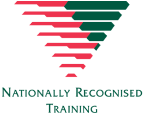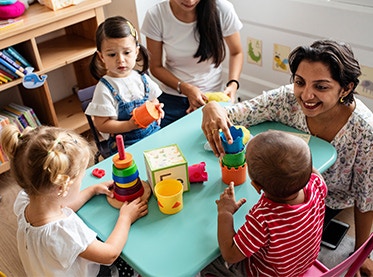
Schools Program
CHC30121 Certificate III in Early Childhood Education and Care
Kickstart your career in Early Childhood Education and Care before you even leave high school, with this flexible-learning course in our Schools Program.
Learn how to support the development of young minds.
If you’re interested in a career in Early Childhood Education, the CHC30121 Certificate III in Early Childhood Education and Care is a valuable foundation course.
This qualification reflects the role of educators in early childhood education and care who work in regulated children’s education and care services in Australia. Your studies will cover the care and nurturing of babies, toddlers and children; planning, implementing and evaluating educational programs; supporting childhood health, safety and wellbeing; and much more.
With this course, you have the opportunity to become qualified for a variety of roles such as Kindergarten Assistant and Early Childhood Educator.
Delivered online with 160 hours of work placement, the Certificate III in Early Childhood Education and Care may also provide you with credits toward your high school certificate, varying slightly by state.

Course Outcomes
Once you’ve completed your CHC30121 Certificate III in Early Childhood Education and Care, you’ll be able to support the implementation of an approved learning framework, and support children’s wellbeing, learning and development under direct supervision or autonomously. You could gain employment as a:

Long Day Care Educator
Working in a Long Day Care Centre, you’ll be in an environment that supports working parents, as these centres provide education and care for children from babies to the age of 12. They usually operate at least 10 hours a day, Monday to Friday, for at least 48 weeks a year and provide full or part-time care. Children may be grouped together according to their age and developmental stage and an approved kindergarten program may also be offered.

Kindergarten Assistant
As a Kindergarten Assistant, you’ll be working in a childhood education environment that is tailored to helping prepare children for prep. You’ll support children with play-based learning and help them to expand their physical abilities, build their confidence and enhance their social skills. Kindergartens usually operate during school hours each school term, and many offer programs for 6 hours a day, 5 days a fortnight during each school term.

Childcare Assistant
A Childcare Assistant provides care and structured learning to children, usually in a day care centre. As a Childcare Assistant, you’ll provide a caring, non-judgemental and supportive environment for all children and their families. You’ll supervise children as they learn and play, provide comfort and reassurance, plan stimulating activities, and keep children clean and safe.

Early Childhood Educator
An Early Childhood Educator, also referred to as a Childcare Worker, is responsible for the care and early education of babies and young children. They work in a range of settings, including kindergartens, childcare centres, community centres or schools. As an Early Childhood Educator, you’ll support the implementation of an approved learning framework, and support children's wellbeing, learning and development. Depending on the setting, educators may work under direct supervision or on their own within a team.
Course Overview
Delivery Structure
Studying the Certificate III in Early Childhood Education and Care with Foundation Education is flexible and you can tailor it to suit your needs. The course is broken down into two parts:
1. THEORETICAL
The theoretical component of this course is delivered online and submitted through our Learning Management System. 17 course units to complete online, at your own pace.
2. WORK PLACEMENT
For mandatory work placement (160 hours), students must have access to a regulated education and care service provider, with an appropriate range of work tasks and ratios of children, AND access to a qualified supervisor. Students must apply for their Working with Children Check at course commencement. Where required, we may assist you in identifying work placement options.
Units
Achieve your qualification by completing the following units of competency:

Want More Info?
Download our free Schools Brochure for more information or call 1300 959 540.
Proud member of

Funding
© Foundation Education | RTO Number 22557
